For decades, the "Reading Wars" have sparked fierce debates over the best way to teach reading. But at the heart of it all, one truth remains: without strong foundational reading skills, students will struggle in school and in life. Phonemic awareness, phonics, fluency, vocabulary, and comprehension aren’t just check boxes in early education; they’re the building blocks that determine a child’s ability to become a fluent, independent reader.
And the reading struggles don’t stop in elementary school. Nearly 30% of eighth graders lack basic reading mastery, meaning far too many students enter high school unprepared to tackle advanced coursework. Without intervention, these gaps don’t just persist—they widen, making graduation and future success even harder to achieve. It’s time to rethink how we support readers at every grade level before it’s too late.
Addressing Foundational Reading Skills in MTSS Highlights
- Strong Foundations Matter. Phonemic awareness, phonics, fluency, vocabulary, and comprehension are key to academic success.
- MTSS Supports All Readers. A tiered system ensures students get the right level of reading intervention.
- Data-Driven Interventions Work. Targeting skill gaps with the right strategies leads to better literacy outcomes.
Barriers to Addressing Foundational Reading Skills
Despite educators' best intentions, many students remain stuck. A well-intentioned intervention plan may miss the mark if it doesn't align with a student’s specific needs—especially their foundational skills. For example, consider a common scenario. A 4th grade student, let’s call her “Anna,“ is disengaged during reading lessons. Assessments confirmed Anna’s skills were far below grade level in phonics and comprehension. Despite receiving interventions targeting fourth-grade reading standards, Anna showed little progress. There are many factors that could have impacted the effectiveness of the intervention plan.
Common Barriers for Reading Intervention Include:
- Mismatched Goals: Students are often given reading interventions aligned to grade-level standards, even when their foundational skills (like phonics) are underdeveloped.
- Time Constraints: Teachers often lack the time to create tailored intervention plans or analyze data effectively.
- Insufficient Tools: Without robust platforms or resources, it’s challenging to accurately assess where foundational gaps exist or track progress over time.
Building Foundational Reading Skills Through an MTSS Framework
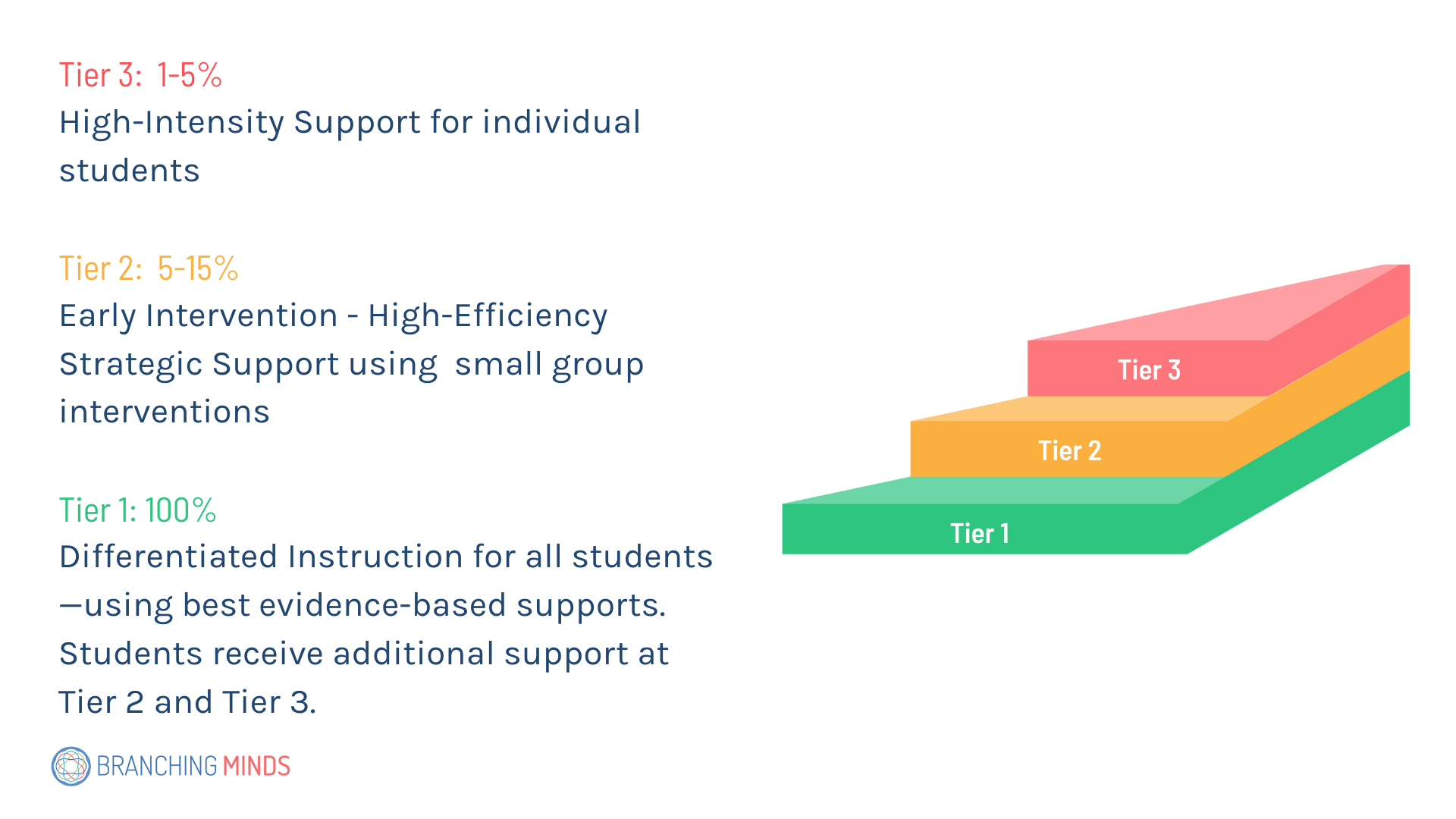
Reading success starts with strong foundational skills, but not all students develop them at the same pace. A well-structured Multi-Tiered System of Supports (MTSS) ensures that every learner gets the instruction and intervention they need—whether they’re just beginning to read or struggling with skills beyond the early grades. By streamlining processes, consolidating data, and ensuring interventions are evidence-based, MTSS helps educators take a proactive approach to literacy instruction. Here’s how MTSS supports foundational reading skills at each level of intervention.
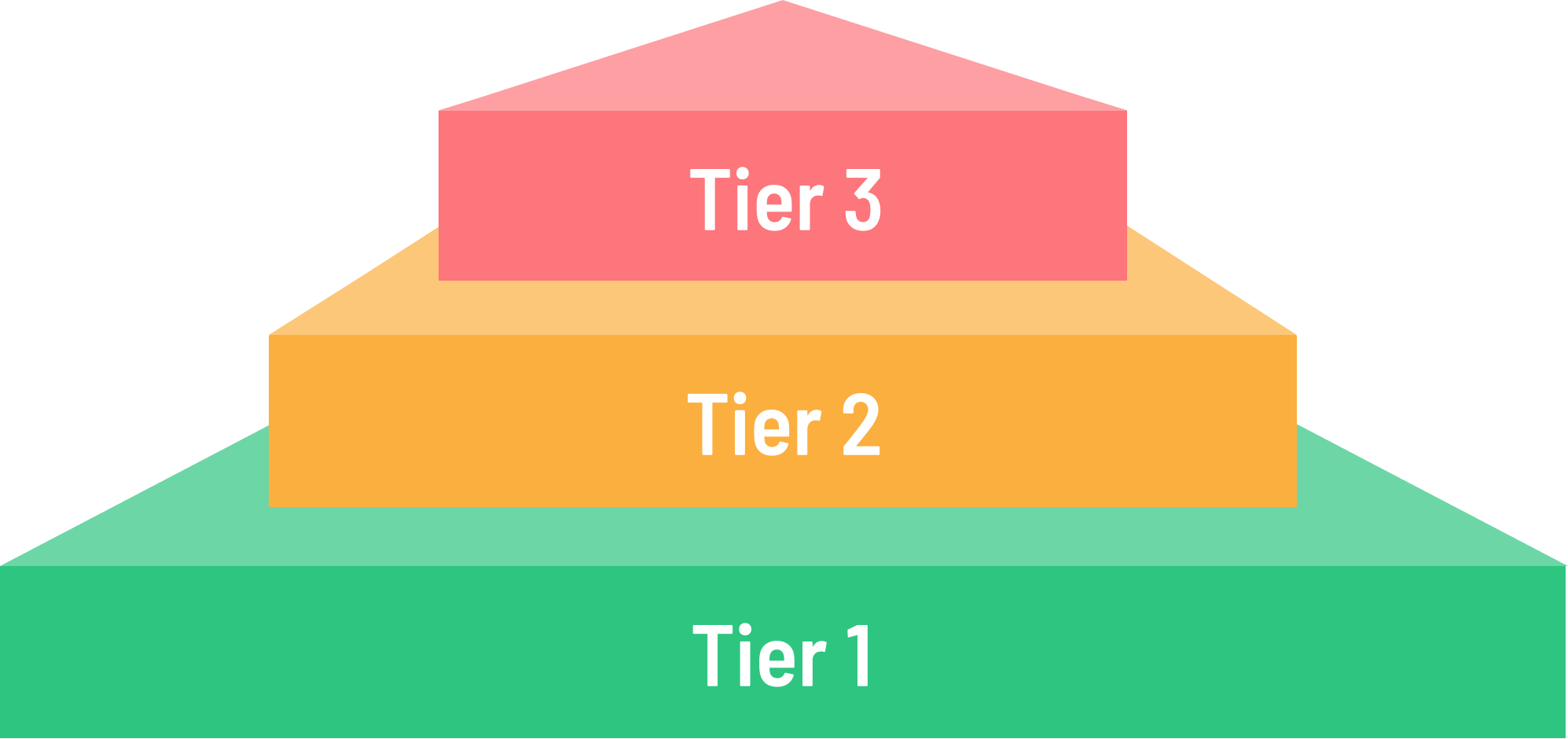
Tier 1 – Core Reading Instruction
At the Tier 1 level, high-quality reading instruction should be the foundation for all students, integrating the five essential components: phonemic awareness, phonics, fluency, vocabulary, and comprehension. Evidence-based curricula ensure that every student receives a strong foundation, while universal screeners like i-Ready help identify those who may need extra support. However, when a significant portion of a class struggles with these foundational skills, it’s a sign that core instruction itself needs to be adjusted. This is especially true beyond third grade—sometimes, moving forward effectively requires taking a step back to reteach critical skills.
Instead of viewing foundational reading instruction as something only for early elementary students, educators should incorporate these essential skills into core instruction at any grade level where gaps exist. Without this approach, struggling readers may continue to fall behind, unable to access grade-level content. By integrating strategic, evidence-based supports within Tier 1 instruction, educators can ensure that all students, regardless of age, build the skills they need to become confident, proficient readers.
Tier 2 – Targeted Interventions
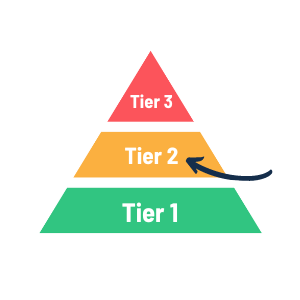
For students who fall below benchmarks, Tier 2 targeted interventions provide the additional support needed to address specific skill deficits. A student struggling with phonics, for example, may benefit from small-group instruction focused on decoding. These interventions should always be aligned with the student’s performance level rather than their grade level—whether they are in first grade or beyond third. Regular progress monitoring, such as weekly skill assessments, ensures that interventions are effective and allows for adjustments as needed. By meeting students where they are and systematically closing skill gaps, educators can help them build the foundational skills necessary to re-engage with grade-level content and stay on track with their peers.
Tier 3 – Intensive Support
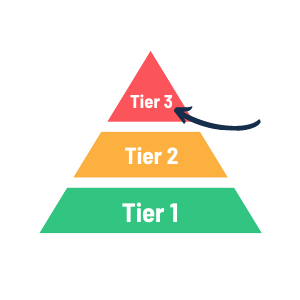
For students who show little to no progress at Tier 2, Tier 3 offers individualized interventions tailored to their unique needs. The main difference with Tier 3 is an increase in the frequency, intensity, and duration of support. Students are spending time one-on-one with a specialist to address significant skill gaps.
Intensive support might include:
-
One-on-one instruction with a reading specialist
-
Accelerated phonics programs like Wilson Reading System or Orton-Gillingham
-
Technology-based tools for extra practice, such as Lexia or Reading Horizons
 Skill-Based vs. Performance-Based Intervention Plans: Choosing the Right Approach
Skill-Based vs. Performance-Based Intervention Plans: Choosing the Right Approach
One key distinction educators must make is between skill-based and performance-based intervention plans. While both approaches play an important role in student success, choosing the wrong one can result in ineffective support that fails to address the root cause of a student’s struggles.
Performance-based Intervention Plans
Performance-based plans focus on improving broad academic or behavioral outcomes—such as increasing student engagement, raising grades, or reducing behavior incidents. These plans rely on strategies like accommodations, modifications, and structured support programs. Progress is monitored by tracking performance trends over time, making these plans effective when foundational skills are not the primary concern.
Skill-based Intervention Plans
In contrast, skill-based plans target specific reading deficits by building foundational literacy skills through direct instruction, guided practice, and frequent progress monitoring. These plans are essential for students who lack critical reading skills, particularly in upper elementary, middle, and high school, where skill gaps can be overlooked in favor of performance-based modifications. Without addressing these gaps, students may continue to struggle, even with accommodations in place.
For many students, a combination of both plans may be necessary, but the first step is always identifying whether the primary challenge is a lack of skills or a lack of engagement. By ensuring intervention plans are skill-focused when necessary, schools can better support struggling readers—helping them develop the foundational abilities they need to succeed in all aspects of literacy.
Providing Educators with Intervention Data and Resources

Successful reading intervention relies on actionable data, collaboration, and access to evidence-based resources. Without these key components, educators may struggle to identify the root causes of reading difficulties and provide the right support.
Consider the common scenario we mentioned above—students like Anna see greater success when teachers have the tools to uncover specific foundational reading deficits and access targeted, evidence-based interventions. Instead of jumping ahead to comprehension strategies, her intervention team could have realigned her goals to focus on phonics and fluency, ensuring she had the necessary skills to engage with grade-level texts.
To achieve this level of precision, schools need a centralized system that streamlines intervention planning and progress monitoring. Additionally, educators can leverage resources like the Florida Center for Reading Research (FCRR) Student Center Activities, the Colorado Department of Education’s evidence-based instructional program list, and platforms like What Works Clearinghouse to find interventions that align with the science of reading.
When educators have the right data and tools at their fingertips, intervention becomes proactive rather than reactive, ensuring struggling readers get the support they need before they fall too far behind.
The Branching Minds MTSS software platform equips educators with real-time data, intervention tracking, and a curated library of research-backed supports—helping teams quickly identify gaps, select the most effective interventions, and ensure consistent follow-through.
Turning Reading Insight into Action
Reading isn’t just an elementary school concern—it’s the key to long-term academic success. Without strong foundational reading skills, students struggle to keep up, and those gaps only grow over time. But with the right support, it’s not too late to help students build the skills they need.
MTSS gives educators a framework to identify gaps early, create targeted intervention plans, and track progress effectively. By prioritizing foundational reading skills at every grade level, we can ensure that students don’t just get by—they thrive. Because when students can read with confidence, they can take on anything—in school and in life.
Reading Skills to Succeed
If you're ready to give every student the reading skills they need to succeed, Branching Minds can help. Book a demo today.
Further your learning with these foundations of reading resources
- Blog: 5 Practical Reading Comprehension Strategies for Secondary Students
- Webinar: Addressing America’s Literacy Crisis Through Evidence-Based Action: Case Study of California's New Literacy Plan
- Article: The Science Behind Reading Is the Key to Addressing and Preventing Literacy Loss

About the author
Dr. Essie Sutton
Essie Sutton is an Applied Developmental Psychologist and the Director of Learning Science at Branching Minds. Her work brings together the fields of Child Development and Education Psychology to improve learning and development for all students. Dr. Sutton is responsible for studying the impacts of the Branching Minds on students’ academic, behavioral, and social-emotional outcomes. She also leverages MTSS research and best practices to develop and improve the Branching Minds platform.
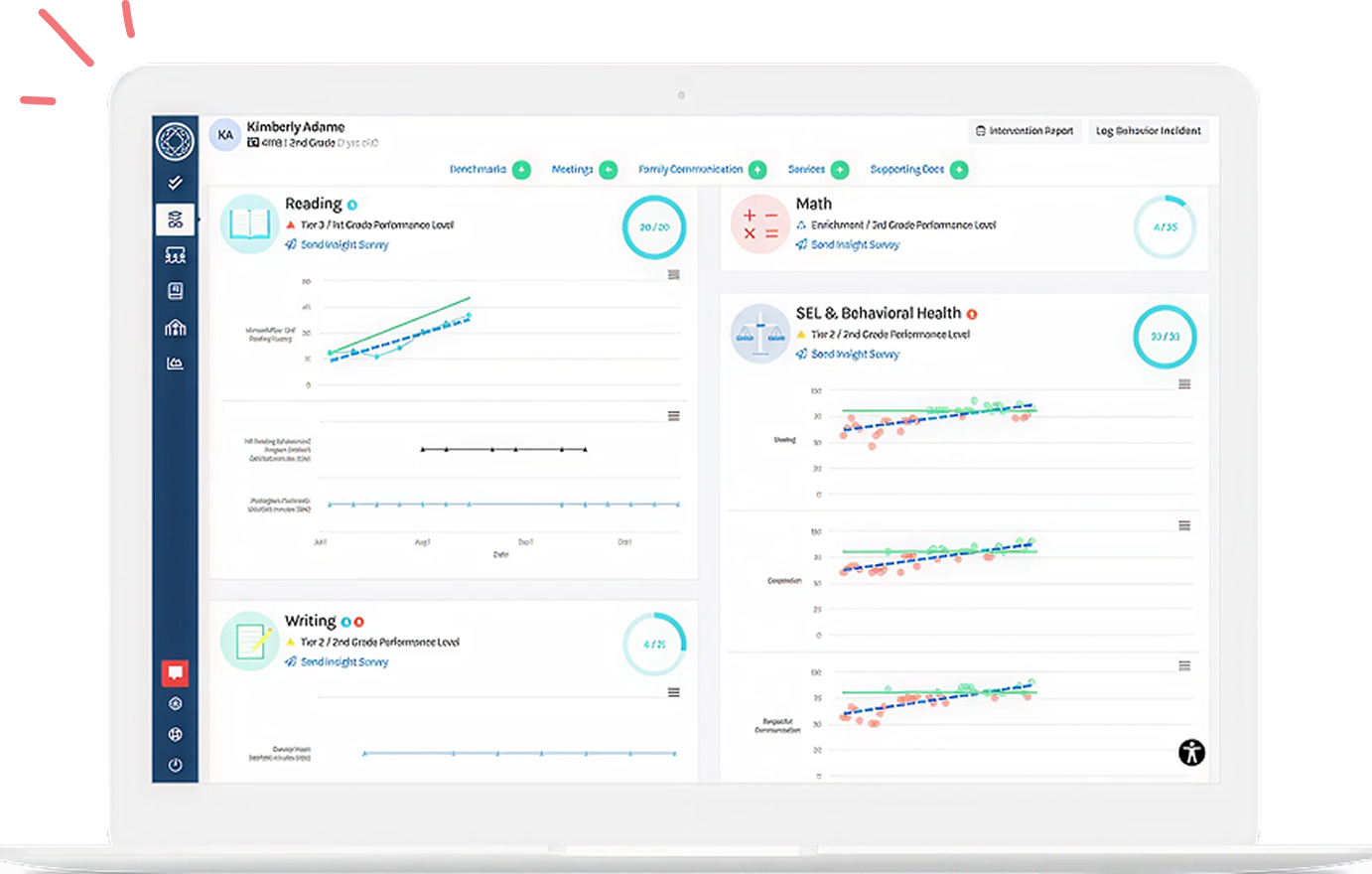
Empower Student Success
Support students at every level with Branching Minds—your partner in delivering targeted, effective interventions through a streamlined MTSS approach.













.png?width=1436&height=956&name=Addressing%20Foundational%20Reading%20Skills%20in%20MTSS%20(preview).png)

.png?width=716&height=522&name=Understanding%20Literacy%20Basics%20(Preview).png)

.png?width=716&height=522&name=Qualitative%20data%20MTSS%20(preview).png)